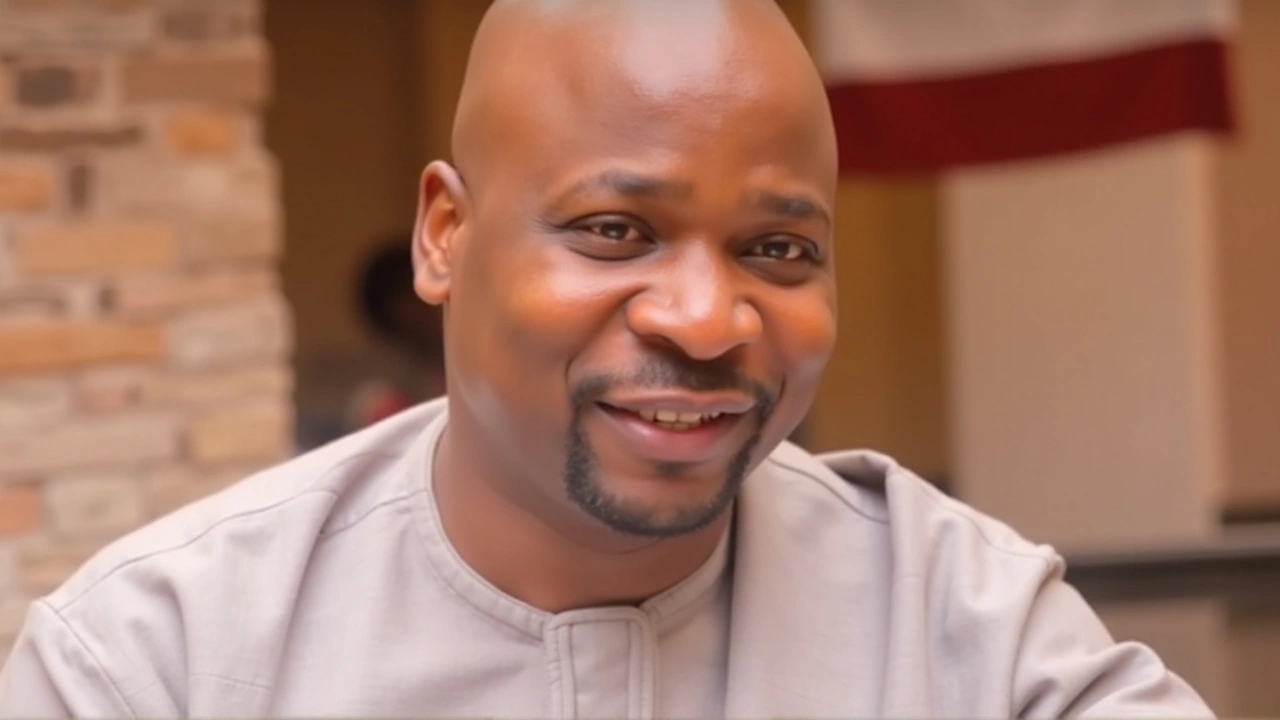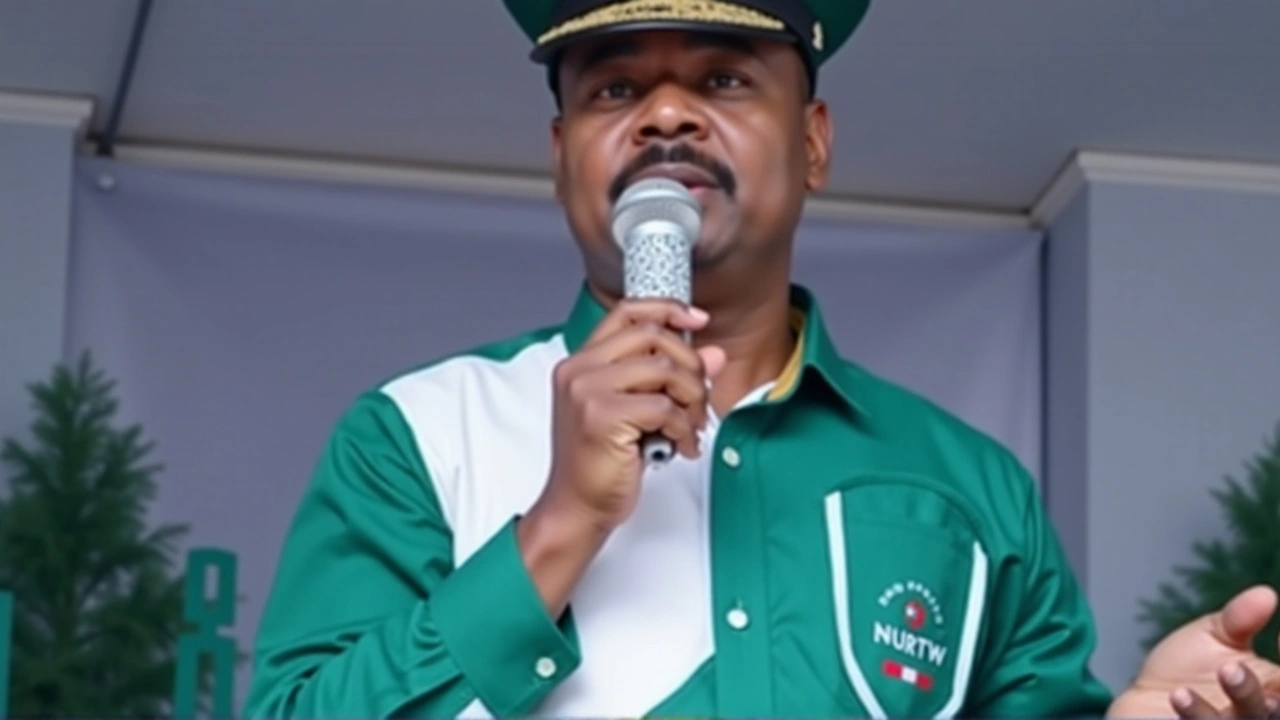MC Oluomo's Ascension as NURTW National President
The election of Musiliu Akinsanya, better known as MC Oluomo, to the position of National President of the National Union of Road Transport Workers (NURTW) marks a significant moment in the history of one of Nigeria's most influential unions. Held at the NURTW's zonal secretariat in Osogbo on November 9, 2024, the election was closely watched by various stakeholders within the transport sector and beyond. MC Oluomo, who previously served as the Lagos State Chapter Chairperson of NURTW, ran unopposed in the union's quadrennial delegate conference, underscoring his strong foothold and popularity among the members.
MC Oluomo's journey to the National Presidency was not without its challenges. Just months prior, he was stripped of his position as the chairperson of the Lagos chapter, a move that sparked widespread conversations about the internal politics of the union. Despite these setbacks, his election as National President signals a remarkable comeback, showcasing his ability to navigate complex organizational dynamics and maintain grassroots support across Nigeria's Road Transport Workers.
Delegates and Observers of the Election
The election saw participation from delegates representing four Southwest Nigerian states - Lagos, Ogun, Ondo, and Ekiti. Each delegate came prepared to contribute to the decision-making process that would shape the future of the NURTW. Notably, the event was overseen by the acting National President at the time, Aliyu Issa-Ore, ensuring the process adhered to the guidelines of transparency and fairness that the union strives to uphold. The participation of delegates from different states highlights the democratic essence of the NURTW, where members are encouraged to play an active role in leadership transitions.
MC Oluomo's Pledge for Unity
Upon being sworn in, MC Oluomo addressed the collective membership with a heartfelt call for unity and reconciliation. 'I have forgiven everyone who has offended me, and I hope those I have offended will forgive me as well,' he declared, setting a tone of camaraderie and collaboration. His words resonated with many, as the NURTW has a diverse and sometimes divisive membership spread across Nigeria. In light of recent challenges, his leadership begins at a crucial time when the union needs a unifying figure to steer its significant roles in the country's transport industry.
MC Oluomo's message of peace is expected to resonate well within the union, potentially leading to more harmonious relationships and a strengthened organization. His promise to preserve and protect the union's integrity, 'We will not allow anyone to destroy our means of livelihood,' captures his dedication to ensuring the welfare and sustainability of the union as it navigates the evolving landscape of Nigeria's transport sector.

Other Key Appointments
Other important appointments were made during the delegate conference, which includes Tajudeen Agbede being elected as the Vice President for the Southwest zone and Akeem Adeosun as a trustee from the same zone. These strategic appointments are viewed as pivotal in supporting MC Oluomo's agenda and in addressing any regional disparities within the union. By ensuring that leadership is well-distributed, the NURTW aims to foster an environment where every member feels represented and heard.
A Look Ahead: Challenges and Expectations
Looking forward, MC Oluomo's tenure as National President is expected to face numerous challenges. Among them is the need to address internal conflicts that have historically plagued the NURTW. Coupled with the ever-increasing demands of modernization in Nigeria's transport networks, his leadership must navigate varying interest groups, each with its own agenda and expectations. Furthermore, the union is under pressure to adapt to technological innovations and legislative changes within the transportation sector, which could impact operations significantly.
Moreover, the NURTW is a major stakeholder in the Nigerian economy. Its operations directly affect the daily lives of millions of commuters and influence the country's overall economic activities. MC Oluomo's administration will need to balance the interests of the drivers, commuters, government regulations, and public perceptions of the union.
Conclusion: A New Chapter for NURTW
In conclusion, MC Oluomo's election as the National President of NURTW is a testament to his resilience and rising influence within the union. While the challenges ahead are significant, they are not insurmountable. With strategic appointments supporting his vision, he is poised to bring about meaningful changes that could redefine the union's role in Nigeria. As he embarks on this journey, both his supporters and critics alike will be keenly observing his actions and leadership style.
This new era for NURTW, under MC Oluomo's guidance, may well dictate the navigating path of how transport unions interact with a rapidly evolving transport landscape across Nigeria. His pledge to prioritize peace, unity, and forgiveness sets a hopeful tone, aiming to transform not only the perception but also the operational realities of the NURTW for its members and the public at large.


Anita Drake
November 11, 2024 AT 01:30Seeing MC Oluomo rise to the national stage is a reminder that solidarity can triumph over division. The transport workers have long needed a voice that genuinely listens to each member’s concerns, and this election could be a turning point. By emphasizing forgiveness and unity, he sets a tone that encourages collaboration across the regions. It’s also an opportunity for the union to modernize its practices while respecting its grassroots roots. Let’s hope this new leadership brings more transparency and genuine support for the drivers on the ground.
We all benefit when the roads run smoother and the workers feel valued.
Eduardo Lopez
November 11, 2024 AT 02:53Unity is not just a buzzword; it’s the foundation for any lasting progress. If we keep the focus on collective well‑being, the transport sector can truly flourish.
Nancy Perez de Lezama
November 11, 2024 AT 05:40Interesting shift in leadership dynamics.
Matt Heitz
November 11, 2024 AT 09:50The election of a high‑profile figure like MC Oluomo to the top job is more than just a headline; it’s a strategic recalibration of power within the NURTW. From a structural standpoint, his ascendancy consolidates the Lagos bloc, which historically commands the lion’s share of the union’s fiscal resources and political clout. This centralization could streamline decision‑making processes, allowing for faster implementation of nationwide policies.
However, the risk lies in marginalizing the peripheral zones that have long felt underrepresented. The Southwest’s dominance may provoke resistance from the North‑East and South‑South factions, potentially igniting factional disputes that could destabilize the union’s unity.
Operationally, his pledge for forgiveness and reconciliation is commendable, yet translating rhetoric into concrete reforms requires robust governance frameworks. We’ll need transparent budget allocations, updated welfare schemes for drivers, and a clear roadmap for integrating emerging transport technologies.
Moreover, the appointment of regional vice presidents, like Tajudeen Agbede, could serve as a balancing act, ensuring that the Southwest’s influence is counterweighted by broader representation.
On the legislative front, upcoming transport bills will test the union’s ability to lobby effectively; a united front will be essential to shape policy outcomes favorably.
In terms of labor relations, his history of both confrontation and negotiation suggests a pragmatic approach-one that may blend assertive bargaining with diplomatic outreach.
Nevertheless, internal conflict resolution mechanisms must be strengthened to prevent the kind of infighting that has historically plagued the NURTW.
Technological adoption, such as digital fare systems and GPS tracking, will demand investment and training; the leadership must allocate funds wisely to avoid widening the gap between modernized and traditional operators.
From an economic perspective, the union’s role in sustaining daily commuter flows can’t be overstated, and any disruption could ripple through the national economy.
Therefore, sustaining operational continuity while pursuing reforms will be a tightrope walk for Oluomo’s administration.
In sum, his presidency offers a blend of opportunity and challenge; the success will hinge on inclusive governance, strategic regional balance, and a steadfast commitment to the welfare of all transport workers across Nigeria.
Susan Mark
November 11, 2024 AT 14:00Congrats to the new leadership! It’s good to see fresh energy being injected into the union. I think a collaborative approach-where the federal and state chapters exchange ideas-could really help modernize the fleet and improve safety standards.
Looking forward to seeing practical steps, like driver training programs and better dispute‑resolution channels. Let’s keep the conversation constructive and focused on real outcomes for the workers.
Jason Jennings
November 11, 2024 AT 20:57Hope this isn’t just another power grab with empty promises. The union needs real change, not just more talk.
Diego Vargas
November 12, 2024 AT 03:53Honestly, the whole thing looks pretty legit if you ask me. MC Oluomo has been around the block, knows the politics, and probably can pull the right strings. Some folks might think it’s just a cameo, but the real work starts now-making sure the drivers get decent pay and the roads stay safe.
Just make sure the new policies aren’t just buzzwords. It’s all about implementation, not just the fancy speeches.
Alex Lee
November 12, 2024 AT 13:37Sounds like a waste of time.
Vida Yamini
November 12, 2024 AT 23:20What a momentous occasion for the entire transport community! I’m genuinely thrilled to see MC Oluomo stepping into a role that carries so much responsibility, and I believe his experience will be a catalyst for positive transformation across the board. The emphasis on unity and forgiveness is especially heart‑warming; it signals a willingness to bridge old divides and foster a cooperative spirit that has often been missing.
From a practical perspective, I hope this new leadership will invest in comprehensive training programs for drivers, focusing not just on technical skills but also on customer service and safety protocols. Moreover, the union should prioritize the deployment of modern technology-think digital ticketing, GPS tracking, and real‑time traffic monitoring-to enhance efficiency and reliability.
Another key area is the welfare of the workers: better health benefits, more transparent pension schemes, and regular wage reviews will go a long way in boosting morale and reducing turnover. It’s also crucial that regional representation remains strong so that even the most remote members feel heard and valued.
Ultimately, this could be the start of a new chapter where collaborative problem‑solving replaces old‑fashioned rivalries. Let’s keep the dialogue open, share ideas, and support one another in building a transport system that serves everyone’s needs.
Here’s to a future where the roads are safer, the journeys smoother, and the workers truly empowered.
James Lawyer
November 13, 2024 AT 11:50From a legal standpoint, the election appears to have adhered to the union’s bylaws, which is encouraging. It will be important, however, to monitor subsequent policy implementations to ensure they align with both national transport regulations and the rights of the workers. A transparent framework for decision‑making could serve as a benchmark for future governance.
Abby Culbertson
November 14, 2024 AT 03:07i kinda think all this is just hype.
Awolumate Muhammed Abayomi
November 14, 2024 AT 18:23Brother, this is a big step forward! Let’s all push hard, keep the spirit alive, and make sure our brothers and sisters on the road get the support they deserve. Unity is our strength, so stay motivated and keep the momentum going!